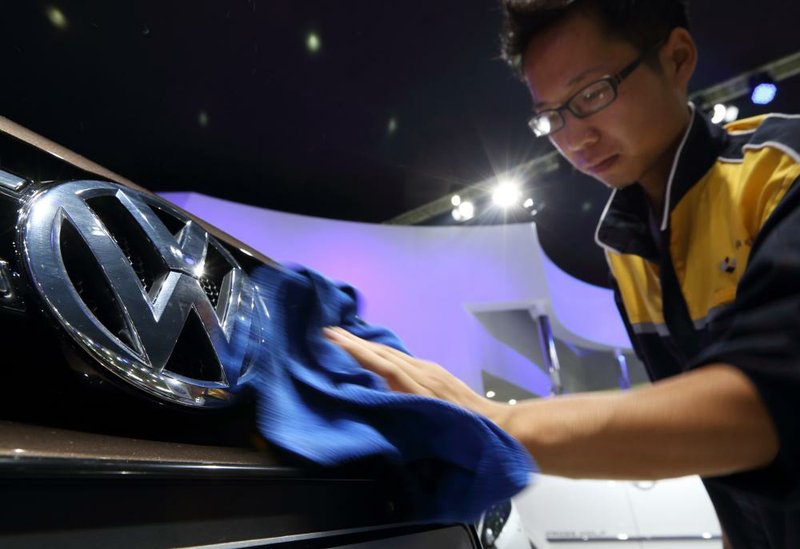SHANGHAI - Volkswagen AG outsold General Motors Co. in China last year for the first time in nine years to recapture the lead among foreign automakers in the world’s largest car market.
Volkswagen’s 2013 deliveries in the country climbed to at least 3.27 million vehicles, according to delivery figures released this week by the German automaker’s Volkswagen, Porsche, Audi and Skoda brands.
Detroit-based GM said earlier this week that the U.S. automaker sold 3.16 million cars in the country.
Unlike GM, Volkswagen counts Hong Kong in its tallies. GM’s figures include light commercial vehicles, which Volkswagen will not include when it releases official figures for the entire group.
Beating GM in China puts Volkswagen a step closer to its goal of becoming the world’s largest carmaker by2018. As the stakes escalate - both have announced investment plans under which the automakers would spend a total of $36 billion in the country - they’ll face mounting competition from the likes of Toyota Motor Corp. and Hyundai Motor Co. at a time when the government is cranking up scrutiny on vehicle sales to combat pollution.
“Volkswagen will probably continue to grow more dynamically in China than GM,” said Frank Schwope,a Hanover, Germany-based analyst with NordLB. “It’s going to remain neck and neck.”
GM shares dropped 46 cents, or 1.1 percent, to close Friday at $40.03.
Although China might already be the world’s biggest auto market, the country has plenty of room to grow as the number of vehicles on its roads only account for about 6 percent of the population, versus 80 percent in the U.S. and 36 percent in South Korea, according to data compiled by Bloomberg.
Such opportunities prompted Volkswagen to say in November that it will spend $24.9 billion in China through 2018. That would help the company double the number of models produced in the country to more than 35, according to Volkswagen.
Among the biggest drivers for Volkswagen last year was Audi, the top-selling luxury car brand in China, as deliveries expanded 21 percent in 2013. The company is counting on sales of the locally produced A3 compact car to spur further gains this year. Porsche, which outperformed industry growth last year as Chinese consumers snapped up Cayenne sport utility vehicles and Panamera sedans, is counting on its new Macan SUV to drive growth in 2014.
At GM, incoming Chief Executive Officer Mary Barra and the company’s newly appointed China head, Matthew Tsien, will face the challenge of regaining the eight-year lead the company held in the country. GM, which in April laid out plans to spend $11 billion in China through 2016, has said it plans to expand the lineup of vehicles for the low-cost Baojun brand in 2014 and introduce nine new or refreshed SUVs in China in the next four years.
In 2013, Buicks and Cadillacs led GM’s 11 percent growth in deliveries, while Chevrolet sales underperformed by expanding 4 percent last year, the company said. GM has said it plans to introduce four new Chevrolet models in the country this year.
All major foreign automakers posted record sales in China last year as it became the first country to see domestic sales of motor vehicles surpass 20 million units - 21.98 million to be exact - in a year. Sales might exceed 24 million this year, the state-backed China Association of Automobile Manufacturers said this week in Beijing.
Behind GM and Volkswagen was Nissan Motor Co., whose sales climbed to 1.27 million units, followed by South Korea’s Hyundai, whose deliveries climbed about 20 percent to exceed 1 million units for the first time, according to company figures compiled by Bloomberg.
Ford Motor Co. overtook Toyota in China to become fifth among foreign automakers after the Dearborn, Mich.-based company’s sales surged 49 percent.
Although China’s motorization has been a boon for foreign automakers, pressure is building on the government to step in as pollution and traffic congestion worsens. That’s prompted more Chinese cities to introduce restrictions on vehicle purchases.
The northern Tianjin municipality began restricting vehicle purchases this year, joining Beijing, Shanghai, Guangzhou and Guiyang in imposing vehicle quotas.
Business, Pages 27 on 01/11/2014
